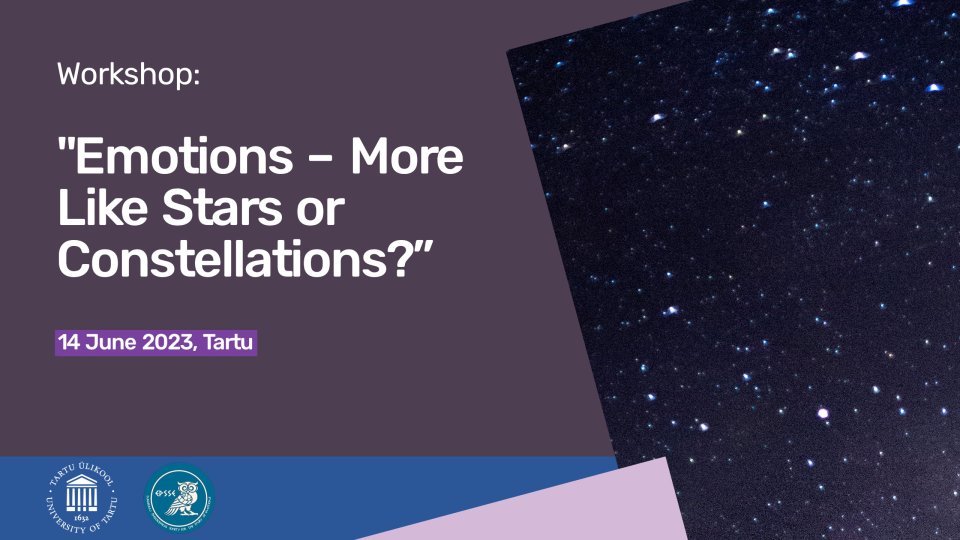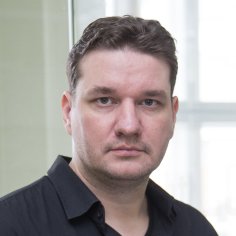Workshop exploring the nature of emotions
University of Tartu Centre for Ethics invites everyone on June 14 to a pre-conference workshop of the 10th Annual Conference of the European Philosophical Society for the Study of Emotions "Emotions – More Like Stars or Constellations?”, which explores the nature of emotions. The conference will take place in Tartu (Lossi 3–328), Estonia.
Are emotions more like stars, or are they more like constellations? That is, are they natural kinds, unified by some objective feature out there in the world that is independent of human conceptualizations, as often advocated by more biologically minded researchers? Or are they subjective kinds dependent on human conceptualizations, as psychological and social constructionists would argue? This is the fundamental question around which the workshop revolves, along with the implications that the kind-status of emotions has for choosing proper methods for the study of emotions, and the role of philosophy in the research of emotion.
Speakers who will share their insights and perspectives:
- Cecilea Mun, Purdue University
- Charlie Kurth, Western Michigan University / University of Helsinki
- Peter Zachar, Auburn University Montgomery
- Bruno Mölder, University of Tartu
- Juan R. Loaiza, Universidad Alberto Hurtado
To secure a place in the workshop, fill out the registration form.
Workshop is organised by Junior Research Fellow in Ethics Heidy Meriste, Professor of Philosophy of Mind Bruno Mölder and Research Fellow in Theoretical Philosophy Uku Tooming.

Pre-conference workshop schedule
10:15-10:30 Introduction by Heidy Meriste
10:30-11:30 Cecilea Mun “Of stars and constellations: Charting the waters with an eye toward cooperation”
11:30-11:45 Break
11:45-12:45 Charlie Kurth “When is an emotion a biological adaptation? A look at shame and guilt”
12:45-14:15 Lunch break
14:15-15:15 Peter Zachar “Analogies and disanalogies between emotions and psychiatric disorders: Folk concepts, essences, and natural kinds”
15:15-15:45 Break
15:45-16:45 Bruno Mölder “An interpretivist perspective on emotions”
16:45-17:00 Break
17:00-18:00 Juan R. Loaiza “The ontology, epistemology, and politics of folk emotion concepts in the science of emotion”
Workshop abstracts
Of Stars and Constellations: Charting the Waters with an Eye Toward Cooperation |

In my recent monograph, Interdisciplinary Foundations for the Science of Emotion (2021), I argued for a pluralistic approach to an interdisciplinary science of emotion, which I refer to as meta-semantic pluralism about emotion. In doing so, I made a distinction between four fundamental categories of theories of emotion (realism, instrumentalism, eliminativism, and eliminative-realism). The theories of emotion that constitute each of these four categories are unified in accordance with their response to two fundamental questions: 1) Are emotions objective kinds or subjective kinds; and 2) are emotion terms in the science of emotion trans-theoretical terms, following Putnam’s (1973) use of the term “trans-theoretical.” In this presentation, I will discuss the fundamental attributes of each of these four categories of theories of emotion, and explain how these categories can considerably clarify the discourse in the interdisciplinary science of emotion. I conclude by presenting my arguments for meta-semantic pluralism about emotion, which is ultimately a realist approach to an interdisciplinary science of emotion.
– Cecilea Mun, Purdue University
When Is an Emotion a Biological Adaptation? A Look at Shame and Guilt |

Are emotions adaptations, the sorts of things that would merit being called natural or biological kinds? To answer this question, I take shame and guilt as case studies. Building on a range of work in philosophy and the cognitive sciences, I begin by specifying a set of criteria that tell for an emotion being an adaptation. Based on these criteria, I then argue that while we have good reason to think that shame is an adaptation, we have little reason to say the same about guilt. This is a surprising conclusion. After all, when it comes to claims about the evolutionary origins of these emotions, guilt and shame are widely thought to stand and fall together. But the discussion of shame and guilt is significant in two further ways. First, we see how a biological-oriented account of shame can accommodate the individual and cultural variation in shame experiences that is often taken as evidence against it being a biological kind. Second, we gain insight into what guilt is given that it is not an adaptation. The overall result, then, is a better understanding of the nature of emotions and how we should study them.
– Charlie Kurth, Western Michigan University / University of Helsinki
Analogies and Disanalogies between Emotions and Psychiatric Disorders: Folk Concepts, Essences, and Natural Kinds |

Many interesting analogies exist between kinds of emotions and kinds of psychiatric disorders. Critics have claimed that both are primarily folk, not scientific concepts. They can both be construed as possessing essences or lacking essences. These disagreements are further complicated by various non-essentialist models of natural kinds for both emotions and psychiatric disorders. Some disanalogies are that emotions are short term episodes and partly identified by being attributed to an object, neither of which is true of most psychiatric disorders. If constituted, emotions are seen as psychologically constituted whereas psychiatric disorders are largely seen as constituted by the practices of classification and psychological measurement. The study of both can benefit from interdisciplinary attention but are also subject to common barriers to interdisciplinary collaboration.
– Peter Zachar, Auburn University Montgomery
An Interpretivist Perspective on Emotions |

The aim of this talk is to delineate the implications of interpretivism for the study of emotions. Intepretivism is a general approach to the mind on which the possession of mental properties is constitutively dependent on a certain kind of ascription. It has not been explicitly developed for emotions, and it should be distinguished from psychological constructionism about emotions, including its interpretivist variants. An important aspect of interpretivism is that it takes the mind and mental states to be “shallow”, that is, circumscribed by our folk psychological conception. It follows from this assumption that mental kinds do not have a deeper essence that would lay beneath the folk psychological classification. The individuation of mental kinds is not independent of us. It depends on our interests and purposes in social interaction and on the particular outlook of our folk psychology. The same applies to emotions insofar as they are taken as mental kinds.
I argue against the idea that emotions are natural kinds, as far as emotions are understood through folk psychology. Natural kinds are classes of homogeneous entities that are individuatively-independent from our minds and that support inductive generalizations. Conceiving emotions through folk psychology and not as natural kinds has implications for the study of emotions, for it makes sense to focus more on the (conceptual and empirical) study of our folk conceptions.
That leaves open the issue of the relationship between folk emotion terms and the related theoretical notions used in affective science (such as “core affect”, “affect program”, “emotional episode”, etc.). On the latter, interpretivism does not preclude empirical work. However, do folk and scientific notions refer to the same thing? I discuss possible positions an interpretivist could take in this regard and conclude that the kinship of folk notions of emotion and scientific notions is more a matter of policy than a fact. It depends on whether we are interested in emphasizing the continuity between the folk conception and its scientific refinements.
– Bruno Mölder, University of Tartu
The Ontology, Epistemology, and Politics of Folk Emotion Concepts in the Science of Emotion |
One important question in emotion science concerns the role of folk emotion concepts in the construction of scientific theories. According to one view, emotion concepts are an integral part of scientific theories, either in the sense that they are constitutive of emotions or in the sense that they anchor scientific concepts. According to another view, folk emotion concepts must be kept separate from scientific concepts, mainly due to their failure to satisfy criteria necessary for empirical research. In my talk, I will defend a view of the first kind, that is, I will argue that folk emotion concepts should anchor scientific concepts. This is because abandoning folk emotion concepts risks changing the explanandum of scientific emotion theories in problematic ways. After I present arguments for this position, I explore some consequences of this approach. Specifically, I will claim that adopting this view raises the question of which folk emotion framework to adopt as the basis for anchoring. Answering this question, I argue, calls for both ontological, epistemological, and political considerations. I conclude by sketching an account of the use of folk emotion concepts that concedes some degree of relativism while maintaining a scientifically tractable picture of emotion science.
– Juan R. Loaiza, Universidad Alberto Hurtado
The European Philosophical Society for the Study of Emotions is a non-profit organization dedicated to fostering the philosophical study of emotions by providing a forum for exchanging views, so as to increase the interaction or collaboration among its members. The Society makes a special effort to involve young philosophers in its activities.


